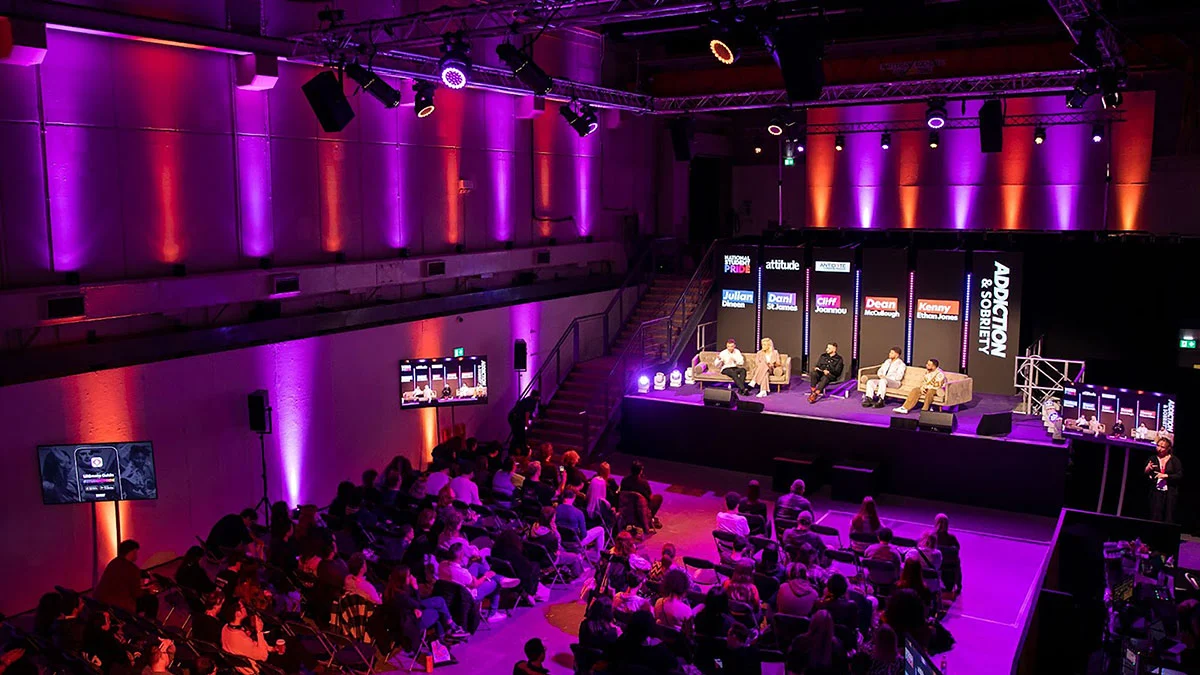
Radio 1’s Dean Mccullough: «Stopping Addiction Doesn’t Turn a Light On, It Is Only The Beginning»
At their Saturday daytime festival this weekend, National Student Pride held a conversation with a panel of individuals who each hold experiences of previous drug and alcohol addictions.
They highlighted how addiction is more prominent in the LGBTQ+ community due to the normalisation of alcohol and drugs, with gay bars and clubs being a common place for the community to socialise. The conversation was hosted by Attitude Magazine editor Cliff Joannou (he/him), along with guest speakers including BBC Radio 1 DJ Dean McCullough (he/him), model and activist Kenny Ethan-Jones (he/him), activist Dani St James (she/her), and London Friend’s Julian Dineen (he/him).
London Friend is an organisation which supports the mental health and wellbeing for members of the LGBTQ+ community, run by individuals part of the community themselves, with guidance on their website for sexual health, opportunities to join support groups as well as steps on how to become a volunteer for the charity.
Each of the speakers gave an overview of what drove them to their previous addictions, with common causes being rooted in their childhood. Dean grew up in a single-parent household in Belfast, where he was bullied for an extended period of time in school. As he got older, Dean said felt as though “people were just tolerating me”. In his childhood, he was told he was “argumentative” and “too much”. Those words lingered and Dean spoke about the impact, sharing “as I got older, I assumed everyone was talking about me.”
He wanted to fit in with the people around him, which at the time resulted in the intake of drugs and alcohol.
Dean also expressed that the pandemic was a time that heightened his alcohol intake, as he realised that he needed the dopamine hit that he was lacking due to the lockdown. «The glass of wine I used to have on a Friday turned into a bottle on a Tuesday, and another on a Wednesday». The end of his addiction started with him telling his best friend «I think I’m going to stop drinking for a month», after realising he wanted to save money for a house, improve his deteriorating mental health, and he wanted to pursue his dream career. This month continued on, and he is currently 3 years sober.
Julian described his childhood as chaotic, growing up in a household with domestic abuse, «I numbed myself with vodka…» «…alcohol gave me comfort.» Julian didn’t seek drug therapy, he instead moved to Australia for 2 years, allowing him to start new and take a redirection. He uses his previous experiences of drug addiction in the Antidote drug and alcohol support system, partners of London Friend. Antidote is the UK’s only LGBT run and targeted drug and alcohol support system. Julian stated «we don’t require people to want to be abstinent», as he aims to eliminate the shame and guilt associated with drug and alcohol addiction.
When explaining her childhood, Dani mentioned that she had a positive experience, as well as her Catholic School not conforming to gender roles, with «gender neutral toilets and unisex toilets”. Dani explained that addiction had manifested itself in many forms of her life. «Addiction has been in every part of my life…I’ve had to have the most of everything.» She said «it wasn’t until later in [her] life that it manifested itself into something that society has demonised so much».
To overcome her addiction, Dani chose the route of Narcotics Anonymous (NA). She now chooses to only partake in LGBTQ+ group therapy, due to other people from the community having a deeper understanding , as they acknowledge that much of the LGBTQ+ community bond and socialise through alcohol and nightlife.
Kenny’s alcohol addiction began when he was 21, after both his Mother and Father passed away six months apart. He was left with a two-bedroom flat in London, not being able to afford rent. «Up until then, alcohol was fun», he said, «it turned into numbing, and helping me sleep». He resulted to consistently drinking Jack Daniels, and leaving notes on his door warning people not to bother him.
To overcome his addiction, Kenny began with «Dry January», which he described as a good time to start, due to it being «more acceptable», as others will have more understanding as to why you’re not drinking. His 1 month sober turned into 2, and so on. It began as a form of discipline for himself but he realised he wanted to «sit intentionally with [his] feelings».
The panel agreed that, in order to help someone that’s possibly suffering with addiction, they must want to first help themselves, agreeing that “only you can help yourself.” Dean advised those suffering to «take a step back, and look at the situation you’re in. Stopping addiction doesn’t turn a light on, it is only the beginning»,
For help and support on drug addiction as a member of the LGBTQ+ community: londonfriend.org.uk/antidote/
